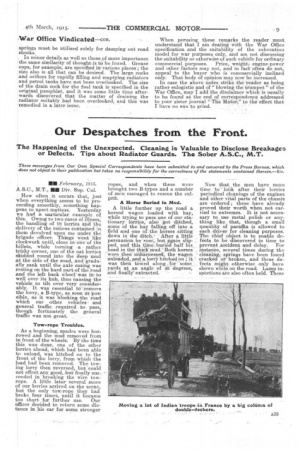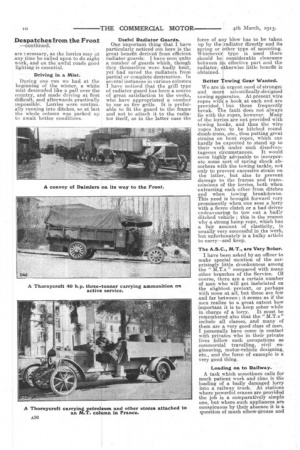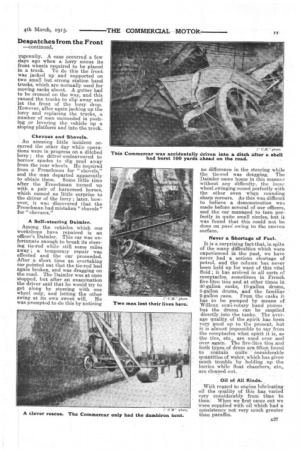Our Despatches from the Front.
Page 9

Page 10

Page 11

If you've noticed an error in this article please click here to report it so we can fix it.
The Happening of the Unexpected. Cleaning is Valuable to Disclose Breakages or Defects. Tips about Radiator Guards. The Sober A.S.C., M.T.
These messages from Our Own Special Correspondents have been submitted to and censored by the Press Bureau, which does not object to ?heir publecation but takes no responsibility for the correctness of the statements contained therein.—En.
RI February, 1915. A.S.C., MT., .111 Div. Sup. Col.
How often it occurs that, just when everything seems to be proceeding smoothly, something happens to upset mattes. 'Yesterday we had a. uarticular example of this. Owing to two cases of illness, the handling of 18 lorries and the delivery of the rations contained in them devolved upon me under the brigade officer. Things went like clockwork until,close to one of -LI* billets, while turning -a rather. tricky corner, one of the oat lorries skidded round into the deeP mud at the side of the road, and 'gradu-: ally sank until the axle casing was resting on the hard part of the road and the left back wheel:was ifi:t0 well over its hub, thus 'causing the vehicle to tilt over very consider., ably. It was essential to'‘-remove the lorry, a B-type as soon as ;pos, sible, as it was docking,. .the road which our other vehicles and general traffic required .to pass, though fortunately the general traffic was not great. .
Tow-rope Troubles.
As a beginning, spades were borrowed and the mud removed from in front of the wheels'. BY the time this was done, one of the other lorries ahead, which had been able to unload, was hitched on to the front of the lorry, from which the load had been removed. The towing lorry then reversed, but could not effect any good, ,but finally succeeded in breaking the Wire towrope. A little laterseveral -more of our lorries arrived on the scene, but the only -tow-rope they had broke four times, until it became too short for further use. Our officer decided to return some distance in his ear for some stronger ropes, and when these werebrought two B-types and a number of .men managed to rescue the culprit. A Horse Buried in Mud.
A little further up the road a horsed wagon loaded with hay, while trying to pass one of our stationary lorries, also got ditched, some of the hay falling off into a field and one of the horses sitting down in the ditch.After a little persuasion he rose, but again slipped, and this time buried half his head in the thick' mud: Both horses were then Unlifirriess.ed, the wagon unloaded,,.ncla,lorrST hitched On ; it was then towed along. for -sonic, yards at an angle of 45 degrees, and finally extracted. -• Now. that the men have more time to -lea after their lorries periodical cleanings of the engines and biller vital parts of the chassis are ordered ; these have already proved their worth when not carried to extremes. It is not necessary to use metal polish or anything like that, though a small quantity of paraffin is allowed to each driver for cleaning purposes. The chief object is to enable defects to be discovered in time to prevent accident and delay. For instance, several times during the cleaning, springs have been found cracked or broken, and these defects mightotherwise only have shown while on the road. Lamp inspections are also often held. These are necessary, as the lorries may at any time be called upon to do night workl and on the awful roads good lighting is essential.
Driving in a Mist.
During one run we had at the beginning of the winter, a white mist descended like a pall over the country, and made driving at first difficult, and afterwards practically impossible: Lorries were continually running into ditches, so at last the whole column was parked up to await better conditions. • Useful Radiator Guards.
One important thing that I have particularly noticed out here is the great benefit derived from efficient radiator guards. I _have seen"quite a number of guards which, though they themselves were •badly bent, yet had saved the radiators from partial or complete destruction. In several instances in various columns I have noticed that the grill type of radiator guard has been a source of great satisfaction to the cooks, who have appropriated a number to use as fire grills. It is preferable to fit the guard to the frame and not to attach it to the radiator itself, as in the latter case the force of any blow has to be taken up by the Iradiator directly and its spring or pther type of mounting. Whicheve type is used there should be considerable clearance between i s effective part and the radiator, therwise little benefit is obtained.
Better owing Gear Wanted.
We are i4i urgent need of stronger and mor scientifically-designed towing apparatus. At present wire ropes with a hook at each end are provided, I but these frequently break. The fault does not always lie with the ropes, however. Many of the lorries are not provided with towing hooks, and thus the wire ropes have to be hitched round dumb-irons, etc.' thus putting great strains on bent ropes, which can hardly be expected to stand up to their work under such disadvantageous circumstances. It would seem highly advisable to incorporate some sort of spring shock absorbers with the towing tackle, not only to prevent excessive strain on the latter, but also to _prevent damage to the frames and transmissions of the lorries, both when extracting each other from ditches and when towing breakdowns. This need is brought forward very prominently when one sees a lorry with a fierce clutch or a bad driver endeavouring to tow out a badly ditched vehicle ; this is the reason why a strong hemp rope, which has a fair amount of elasticity, is usually very successful in the work, but unfortunately is a bulky article to carry—and keep.
The A.S.C., ACT., are Very Sober.
I have been asked by an officer to make special mention of the surprisingly little drunkenness among the " M.T.s " compared with many other branches of the Service. Of course, there are a certain number of men who will get inebriated on the slightest pretext, or perhaps with none at all, but these are few and far between ; it seems as if the men realize to a great extent how important it is to keep sober while in charge of a lorry. It must be remembered also that the " M.T.s " include all classes, and many of them are a very good class of men. I personally have come in contact with privates who in their private lives follow such occupations as commercial travelling, civil engineering, motor-vehicle designing, etc., and the force of example is a very good thing.
Loading on to Railway.
A task which sometimes calls for much patient work and time is the loading of a badly damaged lorry into a railway truck. At stations where powerful cranes are provided the job is a comparatively simple one, but where such appliances are conspicuous by their absence it is a question of much elbow-grease and
Despatches from the Front
—continued.
ingenuity. A case occurred a few days ago when a lorry minus its front wheels required to be placed in a truck. To do this the front was jacked up and supported on two small but strong station hand trucks, which are normally used for moving sacks about. A gutter had to be crossed on the way, and this caused the trucks to slip away and let the front of the lorry drop. However, after again jacking up the lorry and replacing the trucks, a number of men succeeded in pushing or levering the vehicle up a sloping platform and into the truck.
Chevaux and Shovels.
An amusing little incident occurred the other day while operations were in progress on a ditched lorry ; the driver endeavoured to borrow spades to dig mud away from the rear wheels. He inquired from a Frenchman for "shovels," arid the man departed apparently to obtain them. Some little time after the Frenchman turned up with a pair of harnessed horses, which caused no little surprise to the driver of the lorry ; later, however, it was discovered that the Frenchman had mistaken " shovels " for " chevaux."
A Self-steering Daimler.
Among the vehicles which our workshops have repaired is an officer's Daimler. This car was unfortunate enough to break its steering tie-rod while still some miles away ; a temporary repair was effected and the car proceeded. Alter a short time an overtaking car pointed out that the tie-rod had again broken, and was dragging on the road. The Daimler was at once stopped, but after an examination the driver said that he would try to get along by steering with one wheel only, and letting the other swing at its own sweet will. He was prompted to do this by noticing
no difference in the steering while the tie-rod was dragging. The• Daimler came home in this manner without any difficulty, the loose wheel swinging round perfectly with the other even when rounding sharp corners. As this was difficult to believe a demonstration was made before several of our officers, and the ear managed to turn perfectly in quite small circles, but it was found that this .could not be done on pavl owing to the uneven surface.
• • Never a Shortage of Fuel..
It is a surprising fact that, in spite of the many difficulties which were experienced in the past, we have never, had a serious shortage of petrol., and the column has never been held up for want of this vital fluid ; it has arrived in all sorts of receptacles, sometimes in French five-litre tins and at other times in 40-gallon casks, 10-gallon drums, 5-gallon drums, and the familiar 2-gallon cans. From the casks it has to be pumped by means of Willcox semi-rotary hand pumns. ' but the drums can be emptied directly into the tanks. The average quality, of the spirit has been very good up to the present, but it is almost impossible to say from the receptacles what spirit it is, as the tins, etc., are used over and over again. The five-litre tins and both types,of drum are often found to contain quite• considerable quantities of water, which has given much trouble by holding up :the lorries, while float chambers, etc., are cleaned out. • Oil of All • Kinds.
With regard to engine lubricating oil the quality of this has varied very considerably from time to time. When we first came out we were supplied with oil which had a consistency not very much greater than paraffin.




















